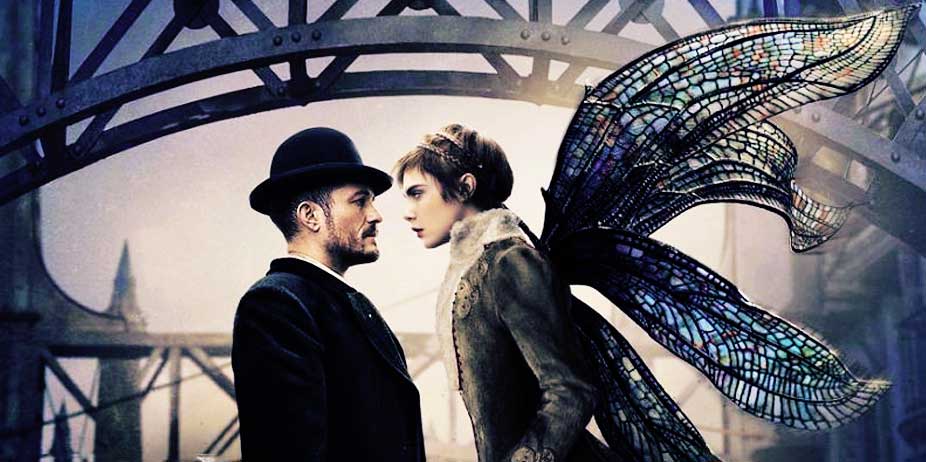 Carnival
Row, Season One (2019)
Carnival
Row, Season One (2019)
Carnival Row is a creative but profane tale of a Victorian London where faerie creatures (centaurs, pixies, and fauns) live alongside the human race.
Humans still retain the upper hand, exporting and trading in the faerie kind as slaves. The freed ones live on Carnival Row beneath a tight curfew that imposes restrictions upon their natural tendencies (no flying!). And someone is now killing fae. With tensions at the breaking point, and fierce debates in Parliament over what to do about it, the police force send in Philo (Orlando Bloom) to investigate. But he has other reasons to visit the Row; he wants to find out where he came from, who his parents are, and why they left him to rot in an orphanage.
After a genocide forces her on board a immigrant ship, Vignette (Cara Delevigne) winds up in London as an indentured servant to Imogen (Tamzin Merchant) and Ezra Spurnrose (Andrew Gower) in London. She chafes beneath their restrictions, and also hopes to track down her best friend, a pixie prostitute currently in business in the Row. But in the process, she discovers the lover she thought dead, Philo, is still alive. Vignette takes matters into her own hands to find him, not realizing that their enemies will stop at nothing to cover up a terrible secret.
I really wanted to like this series more than I did, because it has a great cast. The costume design is magnificent. The music is memorable. And the setting is original. The notion of throwing faeries into a Victorian England and exploring themes of racial prejudice as a social commentary is wonderful. It's part Jack the Ripper, and part star-crossed lovers. Except... the world-building isn't quite good enough, and the content is awful. I'll tackle the latter first. Since the series doesn't establish this world as being different from the Victorian era other than in the inclusion of fantasy races, I'm left to assume it has the same morals that were common in the late 1800s. In that case, a well-bred aristocratic lady would not have sex with someone after their very first kiss, nor be sexually experienced, nor know much about it owing to her protected, upper class status. It just was not "done." Nor would the f-word been used in all classes of life at this time, and yet this series uses it as verbs, adverbs, nouns, and exclamation points. The cops say it. The pixies say it. The aristocrats say it. I got real sick of hearing it. It's crass, lazy dialogue writing.
The characterization is fair, but not memorable, and Bloom isn't charismatic enough to carry off a story that is way more exposition, slow scenes, and dialogue than excitement. I hate to pull a trite card and mention Game of Thrones, but it's clear that's what the writers wanted it to be -- a huge cast (many of them don't need to be here), various plot lines going on simultaneously, and amoral secondary characters. They even stole the idea of incestuous siblings seeking power and justifying it as being historical. The result means it's a bit of a disjointed mess that is often slow. I had trouble staying interested, and felt it could have told the same story in fewer episodes.
Some of the characters, I did become fond of, but others never caught my sympathy. Imogen falling in love with a Puck is one of the best subplots, but it shifts too quickly from antagonistic arguments in the park to them removing each other's clothes. I also felt the episode that took place in the past should have been the opening episode, or taken place entirely in flashback scenes, since it was jarring to move back and forth. It also set up things that never paid off in the rest of the series (such as the werewolves that... must not exist in London). The final episode solves the mystery, but also sets up season two. I hope the next season has a little less profanity and a little more world-building.
Sexual Content
Graphic. Six sex scenes (most with nudity, all with movement; one
is arguably bestiality since it takes place between a human and a puck; and one
of them may be incestuous; the woman justifies it as that's how you create
dynasties). Nine scenes with nudity in them (upper female, bare backsides). Two
scenes with full frontal nudity on corpses (one male, one female). A man tries
to rape a pixie, who bludgeons him to get away
Language:
Hundreds of f-words. Uses of c*nt, p*ssy, d*ck. Other general
profanities.
Violence:
Faeries are shot through the head and ripped apart by a
monster. Guts/entrails are left laying in the street. Characters are punched,
kicked, and stabbed. Cops throw a man into a cell hoping he'll be beaten up by
fellow prisoners. A man is smothered to death. Another man is repeatedly
stabbed. A witch chops a creature in several pieces, but it stays alive. Threats
of violence. Fisticuffs. Many pixies are abused.
Other:
One fae is a witch who foretells omens, reads the
future in the entrails of murdered beasts, etc.
